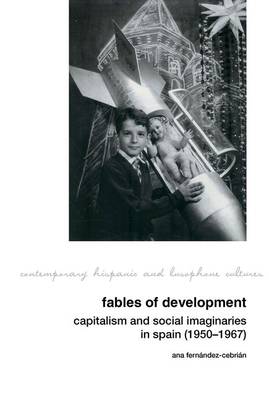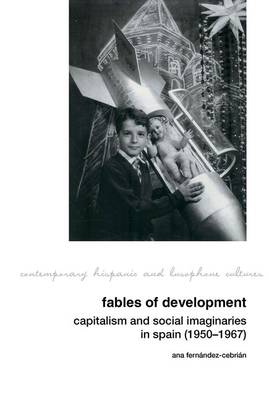
- Retrait gratuit dans votre magasin Club
- 7.000.000 titres dans notre catalogue
- Payer en toute sécurité
- Toujours un magasin près de chez vous
- Retrait gratuit dans votre magasin Club
- 7.000.0000 titres dans notre catalogue
- Payer en toute sécurité
- Toujours un magasin près de chez vous
Fables of Development: Capitalism and Social Imaginaries in Spain (1950-1967)
AnaDescription
An Open Access edition of this book is available on the Liverpool University Press website and the OAPEN library as part of the Opening the Future project with COPIM.
Fables of Development: Capitalism and Social Imaginaries in Spain (1950-1967) focuses on a basic paradox: why is it that the so-called "Spanish economic miracle" --a purportedly secular, rational, and technocratic process-- was fictionally portrayed through providential narratives in which supernatural and extraordinary elements were often involved? In order to answer this question, this book examines cultural fictions and social life at the time when Spain turned from autarchy to the project of industrial and tourist development. Beyond the narratives about progress, modernity, and consumer satisfaction on a global and national level, the cultural archives of the period offer intellectual findings about the expectations of a social majority who lived in the precariousness and who did not have sufficient income to acquire the consumer goods that were advertised. Through the scrutiny of interdisciplinary archives (literary texts, cinema, newsreels, comics, and journalistic sources, among other cultural artifacts), each chapter offers an analysis of the social imaginaries about the circulation and distribution of capital and resources in the period from 1950, when General Franco's government began to integrate into international markets and institutions following its agreements with the United States, to 1967, when the implementation of the First Development Plan (1964-1967) was completed.
Spécifications
Parties prenantes
- Auteur(s) :
- Editeur:
Contenu
- Nombre de pages :
- 224
- Langue:
- Anglais
- Collection :
- Tome:
- n° 27
Caractéristiques
- EAN:
- 9781802078053
- Date de parution :
- 01-06-23
- Format:
- Livre relié
- Format numérique:
- Genaaid
- Dimensions :
- 157 mm x 224 mm
- Poids :
- 476 g

Les avis
Nous publions uniquement les avis qui respectent les conditions requises. Consultez nos conditions pour les avis.






